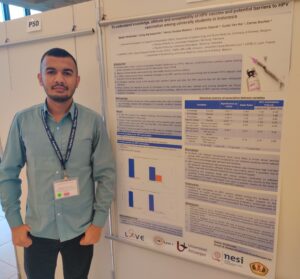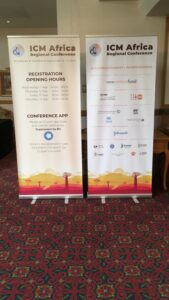Networking & Advocacy Activities 2019
Global Vaccine Safety Summit, Geneva, Switzerland
The Global Vaccine Safety Summit was organised by WHO, from 2 to 3 December 2019, in Geneva, Switzerland.
The WHO’s Global Advisory Committee on Vaccine Safety (GACVS) celebrated its 20th anniversary in 2019. Therefore, the Global Vaccine Safety Summit was an opportunity to take stock of GACVS accomplishments and look towards priorities for the next decade. The draft Global Vaccine Safety Blueprint 2.0 strategy 2021-2030 was presented to the delegates.
The Summit was attended by vaccine safety stakeholders from around the world, including current and former members of GACVS, immunisation programme managers, national regulatory authorities, pharmacovigilance staff, representatives of UN agencies, academic institutions, technical partners, industry representatives and funding agencies. NESI was invited to attend the Summit as VSN member.
Annual International Society for Vaccines (ISV) Congress, Ghent, Belgium
The 13th Annual ISV congress was organised by the International Society for Vaccines (ISV) from 27 to 29 October 2019 in Ghent, Belgium. The ISV Annual congress is the world largest scientific conference for basic and clinical researchers interested in vaccines and the underlying sciences with broad coverage of topics related to vaccines ranging from basic research through manufacturing and clinical trials for human and veterinary vaccines encompassing infectious diseases and cancer.
The congress was attended by over 400 participants from academia, research institutes, non-profit organizations and industry. The conference provided a platform to exchange ideas through lively discussions led by session chairs and through vibrant interactive poster sessions among the participants.
Poster presentation
To understand knowledge, attitude and acceptability of HPV vaccine and potential barriers to HPV vaccination among university students in Indonesia
Madan Khatiwada, Cissy Kartasasmita, Henny Suzana Mediani, Christine Delprat, Guido Van Hal, Carine Dochez.

Vaccine Safety Net Workshop, Geneva, Switzerland
The Vaccine Safety Net (VSN) is a global network of websites, established by the World Health Organization, that provides reliable information on vaccine safety. VSN organized a workshop to discuss best practices on promoting credible, accurate, compelling vaccine and vaccine safety information online and using data and analytics for decision making in vaccine and vaccine safety communication. In addition, CDC-VSN “minimum package” project on recommended content and structure for immunisation programme and other vaccine related government websites (including social media channels) was also discussed. The representative from social media platforms like Facebook, YouTube and Pinterest shared their work on how they are minimizing the flow of misinformation on vaccines related topics in their respective platform. Some of the countries also shared their experience on the influence of social media like Facebook in immunisation programme and mass vaccination campaign.
NESI has been an active VSN member for last two years and therefore, was invited to attend the workshop remotely. In total, 102 participants attended the workshop in person and remotely. The workshop included interactive presentations, group work discussions and trainings on using data and analytics for decision making on vaccine and vaccine safety communication.
Africa Regional Conference of the International Confederation of Midwives, Windhoek, Namibia
The Africa Regional Conference of the International Confederation of Midwives (ICM) was organised from 12 to 14 September 2019 in Windhoek, Namibia. The theme of the conference was: “Midwives leading the way for quality and equity in Africa”.
NESI was invited by ICM to organize a parallel session during this conference: “Role of midwives in advocating for and supporting neonatal and maternal immunisation programmes”. The session addressed the scientific rationale for neonatal and maternal immunisation, and gave an overview of the current status of neonatal and maternal immunisation programmes in countries in the African Region. These presentations were followed by a panel discussion on how to improve the uptake of neonatal and maternal immunisation. Two midwives participated in the panel discussion and shared their views and experiences. The closing presentation focused on an overview of the vaccine pipeline for neonatal and maternal immunisation. The session was organized in collaboration with the University of Nairobi, WHO/Namibia and VACFA/University of Cape Town.
More than 400 participants attended the conference. It was the first time during a conference of ICM that immunisation issues were discussed. It was observed that there is a need for training midwives on the important role they have in supporting immunisation programmes and specific areas of training needs were identified.

Strategic Advisory Group of Experts (SAGE) meetings, Geneva, Switzerland
The Strategic Advisory Group of Experts (SAGE) meetings were organised by WHO from 2 to 4 April 2019, and from 8 to 10 October 2019, in Geneva, Switzerland. SAGE advises WHO on overall global policies and strategies, ranging from vaccine research and development, to delivery of immunisation services and linking immunisation with other health interventions. SAGE usually meets twice a year and reports directly to the Director-General of WHO.
SAGE is an excellent opportunity for NESI to network but also for understanding the rationale supporting WHO’s recommendations on vaccines and immunisation. These evidence-based arguments can immediately be incorporated in NESI’s education and training activities enriching discussions with the most up-to-date information, especially relevant for vaccinology courses and workshops focusing on new vaccine introduction.
During the SAGE meeting in October 2019, NESI, among other partners, was also invited to participate in the NITAG side meeting. The objectives of this side meeting included: (1) Present NITAG support and GNN priority activities for 2019-2020; (2) Share NITAGs current priorities; (3) Discuss SAGE’s role in supporting NITAGs; and (4) Discuss the role of NITAGs in relation with other existing committees. NITAG members of the following countries participated in the side meeting: Angola, Belarus, Brunei, Ecuador, Iraq and Syria. The meeting was chaired by WHO/HQ and the chair of GNN.
7th SOMIPEV Symposium, Marrakech, Morocco
NESI was invited by SOMIPEV to attend the 7th SOMIPEV symposium from 29 to 31 March 2019 in Marrakech, Morocco. The symposium was organised back-to-back with the joint NESI-SOMIPEV workshop on varicella vaccination.
The symposium addressed the following topics: antibiotic treatment; infectious diseases, epidemiology and vaccinology (varicella, HPV, meningococcal and influenza vaccines); acute and recurrent respiratory infections; nutrition; encephalitis.
The majority of participants were from Morocco, but SOMIPEV also aims to strengthen South-South collaboration. Delegates from Algeria, Benin, Cote d’Ivoire, Mali, Mauritania, Niger, Tunisia and Senegal also attended the symposium.
During the closing ceremony, the excellent and longstanding collaboration between SOMIPEV and NESI was acknowledged.
Second WHO African Health Forum, Praia, Cabo Verde
The Second WHO African Health Forum was jointly convened by WHO/AFRO and the Government of Cabo Verde from 26 to 28 March 2019, in Praia, Cabo Verde. The theme of the Forum was “Achieving universal health coverage and health security: the Africa we want to see”.
The Forum was attended by a broad range of participants: high-ranking government officials from the Ministry of Health and other Ministries, parliamentarians, civil society organisation and youth representatives, UN agencies, academia, media and other stakeholders. NESI was invited by the WHO Regional Director of the African Region to attend the Forum.
The Forum was organised in four major sessions:
- Taking Universal Health Coverage to the Next Level in Africa: Leaving No One Behind
- Multi-sectoral Collaboration to Improve Health Outcomes
- Moving Beyond Rhetoric to Evidence-Based Engagement of the Private Sector for Universal Health Coverage
- Collaboration for Improved Coordination, Preparedness and Global Health Security
For each of these key thematic areas, recommendations were made to Member States, as well as to WHO and other UN agencies, partners and the private sector as applicable.
Regional Immunisation Technical Advisory Group meeting and African Regional Immunisation Stakeholders Meeting, Brazzaville, Congo
The Second WHO African Health Forum was jointly convened by WHO/AFRO and the Government of Cabo Verde from 26 to 28 March 2019, in Praia, Cabo Verde. The theme of the Forum was “Achieving universal health coverage and health security: the Africa we want to see”.
The Forum was attended by a broad range of participants: high-ranking government officials from the Ministry of Health and other Ministries, parliamentarians, civil society organisation and youth representatives, UN agencies, academia, media and other stakeholders. NESI was invited by the WHO Regional Director of the African Region to attend the Forum.
The Forum was organised in four major sessions:
- Taking Universal Health Coverage to the Next Level in Africa: Leaving No One Behind
- Multi-sectoral Collaboration to Improve Health Outcomes
- Moving Beyond Rhetoric to Evidence-Based Engagement of the Private Sector for Universal Health Coverage
- Collaboration for Improved Coordination, Preparedness and Global Health Security
For each of these key thematic areas, recommendations were made to Member States, as well as to WHO and other UN agencies, partners and the private sector as applicable.
